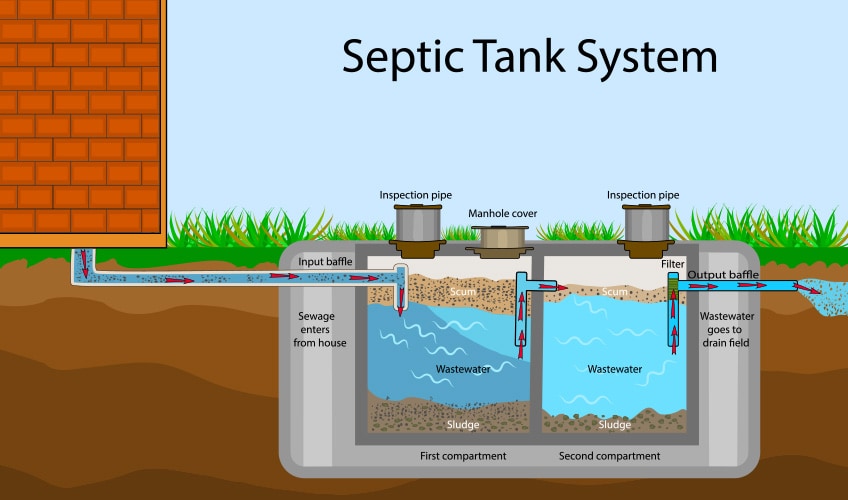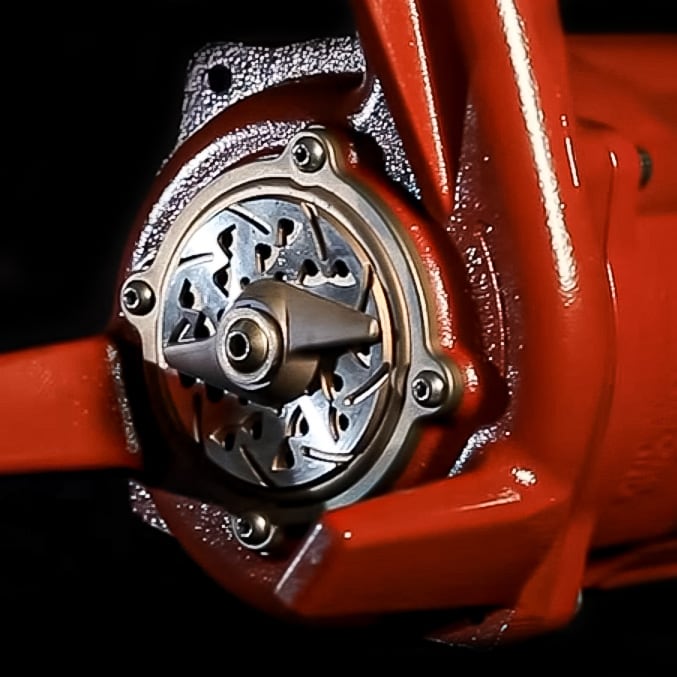
Ultimate Homeowner's Guide to Septic Tank Systems
Living in the countryside is great, but it does come with some additional responsibilities and a whole lot more self-reliance.
Homes outside of cities that do not have access to a city sewer, rely on septic tank systems. Whether you've wondered how often to pump a septic tank, or how to take care of one, this guide will teach you everything you need to know to manage your septic tank system and maintain it with confidence.
What is a Septic Tank?
A septic tank is an underground storage tank for sewage waste for homes that don't have access to city sewer systems. They vary in size and composition, but their purpose is the same: to hold sewage and provide basic sanitation and wastewater treatment until the tank requires emptying by a company that offers septic tank pumping.
A septic tank typically holds waste long enough for solids to separate from the liquid and discharges that wastewater to a drainage field (called a leach field) or soil absorption field. That effluent water contains organic wastewater that will be discharged into the soil and fertilize it. An example of how a septic system works is illustrated below.

How Often Should a Septic Tank be Pumped?
Because every septic tank is custom-sized based on the home and local codes, it's hard to generalize how quickly a given septic tank needs to be pumped. However, it is best practice to have sewage professionals inspect your septic tank every three years or sooner, and have it pumped every five years or less, depending on the size, the number of people in the home, and their habits. If you just purchased a home with a septic system, have it inspected right away by a professional.
How Much Does it Cost to Pump a Septic Tank?
Based on the national and regional averages, a homeowner can expect to spend anywhere between $200 - $600 every time the septic tank is pumped, though this depends on the company, size of the tank, and other factors. To put this into perspective, if you pump your septic tank every five years and the cost was $300, you only paid $60 per year to manage your sewage, which is less than the cost of sewage management when living in the average apartment.
Signs Your Septic Tank is Getting Full
Homeowners often worry about when the septic tank will be full, and rightly so. If you wait too long or ignore the signs, your sign may come as the worst and most obvious one: a sewage backup. Some other signs your tank is close to full are outlined below:
- Strong odors coming up in drain pipes like the sink, dishwasher, or laundry machine
- Chronic slow draining of pipes after troubleshooting and attempted fixes
- Water pooling around the septic tank site in your yard
- Luscious green grass near septic tank site (healthier than normal grass)
*Homeowner Tip: In periods of heavy rain, the septic can actually fill up at times, and it may seem like you have an issue, but really the water just needs to go down over time.
How Are Septic Tanks Pumped?
When you hire a company to pump your septic tank, they will likely come with a large truck with a giant tank. Attached to this truck is a giant suction hose that literally sucks up the waste from your septic tank once it is opened. That sewage is pumped out and stored in their truck and transported to a sewage processing site and safely handled.
How to Maintain a Septic Tank
 When regularly maintained and serviced, a septic tank can last forty years or more and run smoothly without issue. However, if you don't maintain it, eventually, you could experience backups of sewage in the home, above ground, or in groundwater supplies, which is a dangerous and costly expense to fix. In most cases, after the harmful sewage is removed, you'll need to replace the entire septic tank, a cost that can soar above $10,000.
When regularly maintained and serviced, a septic tank can last forty years or more and run smoothly without issue. However, if you don't maintain it, eventually, you could experience backups of sewage in the home, above ground, or in groundwater supplies, which is a dangerous and costly expense to fix. In most cases, after the harmful sewage is removed, you'll need to replace the entire septic tank, a cost that can soar above $10,000.
There are septic tank treatment materials that can be flushed down toilets to help break down the material in your septic tank as well, such as Rid-X. Be sure to read the labels on all products to make sure you understand how they work and possible complications for incorrect use prior to purchasing. When in doubt, talk to your plumber about what product they recommend for routine maintenance and how to use it.
Important to remember: with a septic tank system, everything that is discharged down your toilet, shower, sinks, laundry machine, dishwasher, and garbage disposal enters the septic tank, so take caution and be aware of what is sent down your drains.
 *Pro-Tip: Contrary to popular opinion, if you own rental properties using a septic tank system, or are worried about solid items being flushed down your drains or toilet, we still do not recommend getting a grinder pump because they shred everything up into such a fine slurry, solids are unable to be separated from liquids, and are passed through the secondary system (a bad thing). But, be sure to consult with a professional plumber for specific advice on your application.
*Pro-Tip: Contrary to popular opinion, if you own rental properties using a septic tank system, or are worried about solid items being flushed down your drains or toilet, we still do not recommend getting a grinder pump because they shred everything up into such a fine slurry, solids are unable to be separated from liquids, and are passed through the secondary system (a bad thing). But, be sure to consult with a professional plumber for specific advice on your application.
Important Maintenance Tips for Your Septic Tank
- Have the tank inspected and pumped regularly, every few years
- Avoid overusing water (septic tanks can fill up or overflow with greywater while being filtered)
- Use high-efficiency toilets, faucets, showerheads, and appliances, like dishwashers and laundry machines
- Do not flush anything down the toilet except human waste and toilet paper. Consider using child locks on toilets
- Avoid draining excessive chemicals and cooking oils in sinks (they kill organisms in the tank that break down the waste)
- Limit or don't use chemical pipe & drain cleaners
How to Clean a Septic Tank Naturally
Some people prefer to maintain their septic tanks with a more hands-on, natural approach. Using a mixture of baking soda, vinegar, and lemon is less harmful than pouring harsh chemical cleaners like bleach down your pipes, and won't kill all the natural bacteria that are critical to breaking down the waste in your tank.
Water the Lawn
Companies like Little Giant also build septic tank pumps specifically designed to pull the clean water from your septic tank to use for watering your lawn or garden, which is another way to recycle and save on water bills.
The Bottom Line
Your septic tank is an investment in sustainable and affordable sewage treatment when you don't have access to city sewer systems. Taking care of it with regular maintenance and service will keep your home functioning like it's supposed to, and you'll avoid the woes and headaches of homeowners who neglect care because it is "out of sight and mind."
With a little time, some homework, and taking the right steps, you can be confident your septic tank system is working as efficiently as it can for years to come.
![]() NEXT: Effluent Pump Buyer's Guide
NEXT: Effluent Pump Buyer's Guide
Septic Tank System FAQs
Can I pump a septic tank myself?
No, pumping a septic tank requires a trained professional and the proper equipment, which isn't normally available to the public. Professionals recommend using a certified septic tank pumping service to ensure the safe removal and treatment of toxic sewage waste.
Can I install a septic tank myself?
Generally, it's not recommended; however, in some states, homeowners can acquire a permit to install a septic tank themselves. However, it must pass state inspection before it becomes operational. This is rare and very difficult for homeowners to attempt, and it is not advised.
How long does it take to pump a septic tank?
A septic tank between 1,000 - 1,250 gallons in size generally takes around 20-30 minutes to empty. A larger tank (1,500 - 2,000 gallons) will take about twice as long, between 45-60 minutes. However, the speed will depend on the company, the equipment, and other factors.
How do I find my septic tank?
There are multiple ways to find your septic tank. The easiest way is to check your home's blueprints or check county records. You could also check your sewer pipes in the basement to see which direction they leave your home. Usually, a septic tank will be buried between 10 and 25 feet away from the home. Another way is to simply schedule maintenance, and the company will locate your tank for you. Sometimes, the grass above the tank may die, giving away it's location. As a tip, once your tank has been found, use a landmark for future reference.
What size is my septic tank?
Most septic tanks range between 1,000 gallons and 2,000 gallons in size. Unless you have already installed a replacement in your home, the best way to determine the size of your tank is to have a company inspect it.
How many years will my septic tank last?
With the proper care and maintenance, a steel septic tank will last 15-20 years without major issues. Concrete septic tanks have a significantly longer life expectancy (40+ years) and are the preferred choice when cost isn't a factor.
How much does a new septic tank replacement cost?
It is hard to estimate because most septic tank systems are dependent on the specific home. However, prices for the tank itself can generally range from $600 - $2,000, depending on the size of the tank and the material. However, don't underestimate the cost of installation, which can also range between $3,000 - $20,000, depending on if the leach field needs to be replaced as well. When it is all said and done, a conservative estimate for a replacement tank and installation might be around $6,000-$8,000, or more.
What not to put in a septic tank
Avoid flushing or draining all of the following items, so they don't end up in your septic tank and causing clogs or damage:
- Disposable diapers
- Handiwipes
- Sanitary Napkins
- Toilet Wand Scrubbers
- Kitchen greases and oils (olive oil, vegetable oil, etc.)
- Trash
- Condoms
- Feminine Products
- Hair
- Cigarette Butts
- Coffee Grounds
- Paper Towel
- Antibacterial soap
- Harsh chemicals
- Small objects
- Dead fish or small animals





